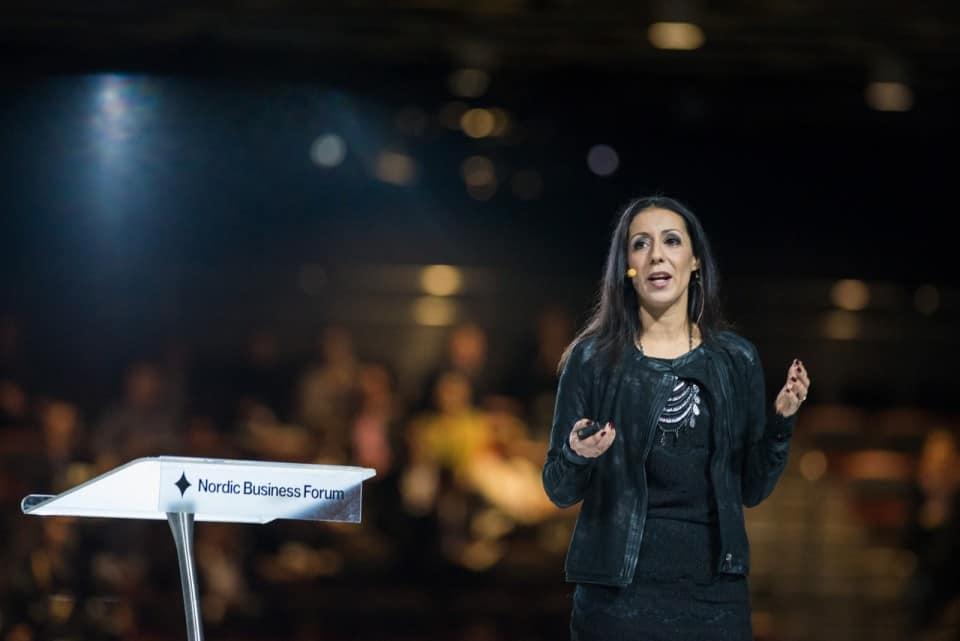30Jan2015
“The Hot Seat” session at Nordic Business Forum 2014 included four young and energizing entrepreneurs such as Linda Liukas, William Wolfram, Anna Nyboe and Vladimir Funtikov.
The panelists are all young, respectable entrepreneurs. The moderator Alf Rehn first introduces us to Finnish businesswoman Linda Liukas, who is well-known for her groundbreaking work among school kids teaching them how to code. The second panelist is young Finnish businessman William Wolfram, who according to Rehn “runs a small company called Deal Dash.” Sarcasm is heavily involved in Rehn’s introduction because in fact, Wolfram has, to some extent, revolutionized the e-Commerce business. Rehn introduces the third panelist, Anna Nyboe from Denmark, as a person who “re-invented the way how we look at unemployment.” Finally Rehn welcomes the final panelist “last, but not the least”, Vladimir Funtikov from Estonia on stage with a declaration “what Vladimir does not know about games, is not worth knowing.”
The panel discussion starts with Rehn’s simple question: how afraid should the old businesspeople be of the young? Liukas gets the first turn and says that they should not be afraid, and further explains with great enthusiasm that basically the only thing young people have is the energy, along with the idea that they don’t know what could or should exist. “The greatness of this era is that the cost of starting something new is close to zero,” she says. She knows it in practice, as she started her book project as a Tumblr project without investment. Rehn pours gasoline on the flames and asks if the people who have invested humongous amount of money should not at all be afraid of the young who revolutionize it by zero cost? Still, the answer is “no.” Wolfram jumps in to say that the chairman of the board of his company is 67 years old, he has learned a lot from those who have 10 to 20 years more experience than him. Wolfram continues that one of the major things is that the young structure their working environment differently. The company operates in six countries and the employees work from home.
“How big can the age of disruption become?” Rehn asks and gives Funtikov his first turn. “As big as you want,” he says and continues that we should not talk about IT as an isolated industry, as IT links and connects with everything. Funtikov agrees with Liukas that the old should not be afraid of the young. He pulls up an anecdote of ancient warriors, where the young came, chopped the old warrior’s head off and took over the business. “We are not in the middle ages anymore, so there is no reason to be afraid,” he concludes.
When it comes to Nyboe’s turn, the opinion changes. She says that in certain circumstances the old should fear the young: “If you do not welcome us in your companies, and if you are not willing to learn from us like we are from you, then you should be scared.” She tells about her client, to whom she has made a great deal of money only because the manager welcomed her in his company. And then there are the other type of clients, “who have had a very annoying young girl in their office,” she says. It appears that she has listened to Soulaima Gourani, as she considers it to be far more important to create a job than find one.
Rehn can really pull these kinds of things through with his knowledge of business, presentation skills and practical jokes. The guests truly seem to enjoy themselves, and often reward both Rehn and the panelists with laughter and applause. A debate like this could be called “practical entertainment” instead of the more banal ‘panel discussion.’ Nyboe’s comment about job creation makes me wonder if NBForum has a strategy that all speakers’ presentations through the years bind together in a unique way. So many little things are connected together that it cannot be a coincidence. Therefore, it is wise not to miss a single presentation over the years.
The next topic is whether the ongoing disruption and chaos is the new normal, or is it just a phase between two stable eras. Liukas gets to start again. She tells about her business, which would be quite impossible to start and run by traditional means. The technology enables her to reach individuals from all around the world, not only Finland where the market is practically close to none. Wolfram says that we haven’t seen anything yet; most of the world’s population is not on the Internet, and only 6 % of U.S. retail stores sell online. “We are going to see a lot more disruption ahead,” he says. Funtikov adds to that a great piece of advice: “The domestic market is not enough. You should say ‘let’s conquer the world – or die trying’.” Liukas concludes the topic with something to think about: “I think the disruption doesn’t come from technology. It comes from people with vision.”
As the discussion continues, the group comes to the point of discussing about people retiring all over the world. That is one of the potential markets for Wolfram’s company. He says, “There are massive amounts of new retirees every day all around the world, quickly moving to shop online. We want to be where they need us to be.” Disruption and the big generations retiring certainly means loss of business for some companies, and a gold mine for others.
Rehn also brings up education for discussion and directs a question to Nyboe, should his son drop out of school or not. Again Rehn question is loaded with sarcasm but during the discussion it turns out that both Nyboe and Wolfram were once university dropouts. Funtikov introduces an interesting term, “self-education.” People have all the possible information with them at all times, and can educate themselves at any time – so why wouldn’t they? If you are studying in a university, nobody really cares if you succeed or not. All the panelists agree that the education system should be changed one way or the other; for example involve companies more. “Education comes and goes, but learning stays,” says Liukas.
While on the topic of education, Rehn takes a question from the Twitter feeds: “Why should all kids understand programming? When will this be included in the elementary school curriculum?” Liukas proudly answers, “The good news is, it is going to be included in the elementary curriculum in Finland in 2016.” Applause, a lot of yays and whistling. For those who don’t know, whistling in Finland is a very positive thing.
Probably the biggest laugh of the whole day comes from Nyboe’s answer to a question many people tend to ask nowadays: how can we help people to find their thing, their passion faster? Nyboe wonders why should it go so fast? Although the panelists are young and have done it fast, this doesn’t mean that everybody should or could. Now, here’s the catch that Nyboe says with a big grin: “We are not like you. Look at how many you are. You are the normal people.”
The audience also seems to love Funtikov’s style. When asked about how big corporations should support young entrepreneurs like the panelists, Funtikov could not answer more succintly: “Financially.” The audience laughs and applauds yet again. When Rehn asks, “What is behind your success?” Funtikov replies, “I was a fool. Like William here, we are a bunch of successful fools.” He briefly tells the reason for his comment; they started a game development company in a country, where nobody had started a game development company. Oh well, somebody has to be the first.
I have to admit; NBForum has done a great job in picking the panelists. As the discussion continues, the panelists get more and more excited, the audience laughs and praises the opinions of each and every one – and the ever-professional Rehn ties the whole thing together brilliantly. Fabulous!
Before wrapping up the panel, everybody gets the chance to say what their next great thing is going to be. Liukas wants to set up an art show where kids can crawl into a computer and see how it works – or she could be a kindergarten teacher in Japan. Nyboe is planning an online course like the MBA programs in the U.S. Wolfram is going to stay on his path, as “they still have a couple of years hard work left.” What about Funtikov then? The user count has grown a lot, but the company hasn’t. His next big thing is to make the company a better place for everyone. Applause and thank you.
Key points from the session:
- You can start with zero investments. The Internet makes it possible for many businesses to operate from anywhere, and reach people all over the world.
- Be open for learning. The young can learn a lot from the long experience of the old – and the old can learn how the modern and digital world operates nowadays.
- Somebody always has to be first. Don’t be afraid to try new things. They may lead you to succeed or fail. In both cases, you will grow and learn.
Linda Liukas is the author of Hello Ruby, a children’s book that teaches programming fundamentals through stories and kid-friendly activities.
Vladimir Funtikov is the co-founder & CEO of Creative Mobile – a Tallinn-based independent game developer/publisher founded in 2010.
Anna Nyboe has run her own company, ANNAWAY since 2011. Her main business is to help especially academically educated people find new jobs.
William Wolfram is the founder and CEO of an e-commerce company DealDash.
Alf Rehn is a Professor of Management and Organization at Åbo Akademi.



